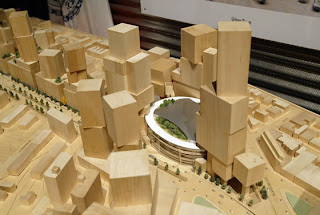 It was half a century ago when the fate of the Brooklyn Dodgers rested on building a proposed new stadium on Atlantic and Flatbush Avenues, a fading transportation hub in the central area of the borough. Dodgers' owner Walter O'Malley wanted the city to seize some of the land for the stadium (which he would build with private money), but Robert Moses, the legendary master builder, balked, claiming that the government could not justify seizing land for the purpose of a private baseball stadium. Of course, the rest is history.
It was half a century ago when the fate of the Brooklyn Dodgers rested on building a proposed new stadium on Atlantic and Flatbush Avenues, a fading transportation hub in the central area of the borough. Dodgers' owner Walter O'Malley wanted the city to seize some of the land for the stadium (which he would build with private money), but Robert Moses, the legendary master builder, balked, claiming that the government could not justify seizing land for the purpose of a private baseball stadium. Of course, the rest is history.
After years of second-class status under the more glamorous Manhattan, Brooklyn has come back to its own, establishing (or re-establishing) a unique identity. With a successful rebuilding of once "lost" neighborhoods, an influx of new residents and the resulting increased property values, Brooklyn has become chi-chi once again. In sports, it has a thriving minor league team playing in Coney Island and will soon become home to its first major league professional team, the NBA Nets, since the Dodger bid adieu.
That dream came closer to reality when the U.S. Court of Appeals for the Second Circuit upheld the right of the state to seize private land as part of a massive redevelopment program, thereby rejecting the plaintiffs' claims it violated the "Public Use" clause of the Fifth Amendment. In an opinion consistent with established precedent, Judge Robert Katzmann, in Goldstein v. Pataki, affirmed a lower court ruling that the redevelopment program was not simply a "pretext" for the Nets owner to build his stadium and office and apartment buidings around it.
Bruce Ratner makes his living as a real estate developer who also happens to own the Nets. His goal was to move the team from its present location in East Rutherford, NJ to Brooklyn and has crafted together a plan to finance a new stadium (to be known as the Barclays' Center). Working in conjunction with the State, the project, known as The Atlantic Yards Arena and Redevelopment Project is a publicly subsidized development project set to cover twenty-two acres in and around the Metropolitan Transit Authority's (MTA) Vanderbilt Yards, an area which covers Atlantic and Flatbush Avenues. It would include, in addition to the new arena, "a public open space, the creation of affordable housing units and the redevelopment of an area in downtown Brooklyn afflicted for decades with substantial blight."
Although most of the land is owned by the MTA, a state entity, some of the adjacent land is privately owned and was the subject of this appeal. The main contention was that Ratner was the sole beneficiary of this development. In affirming the trial court, the Judge Katzmann's opinion was consistent in allowing the state considerable discretion in determining what is a "taking for public use" under the Fifth Amendment. The court stated: "Over the last century reflecting the direction of Supreme Court case law, federal courts have had a much greater role in addressing what type of governmental action constitutes a taking and what level of compensation is just, leaving to legislatures to determine, in all but the most extreme cases, whether a taking fulfills the public-use requirement." Citing past Supreme Court and circuit court cases, the opinion concluded: [O]nce we discern a valid public use to which the project is rationally related, it "makes no difference that the property will be transferred to private developers, for the power of eminent domain is merely the means to the end."
In so concluding, the court rejected the argument that the project's public benefits are serving as a "pretext" for "enriching" Ratner and distinguished this set of fact from those of the recent Supreme Court ruling in Kelo v. City of New London, 545 U.S. 469 (2005). In a single sentence, the majority opinion in Kelo stated that a city could not take property under the "mere pretext" of a public purpose when its actual purpose was to bestow a private benefit. This court found no such pretext here.
The court's ruling is a proper and reasonable one, giving the government proper deference and determining that this dispute is more political than judicial. However, it is ironic that the Nets wil get the facility that Walter O'Malley wanted.





0 comments:
Post a Comment